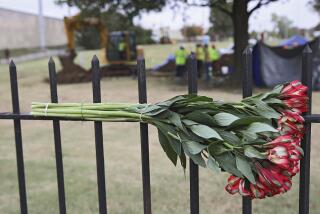Assisted suicide or a show of love?
SAN MARCOS, Calif. —When paramedics arrived at the Purdy home March 20, Margaret was seated in her favorite chair in the living room. The morning sunshine streamed in through a picture window that overlooked a valley. A plastic bag was over her head, tied securely at the neck.
A suicide note in her handwriting was in a folder on her desk, beneath a shelf with books about death and dying. She had written that the pain from her various medical conditions had become unbearable.
Alan Purdy met the paramedics at the door. He said that his 84-year-old wife had taken 30 sleeping pills mixed with applesauce and then suffocated herself.
Please hurry, he recalled telling them. She had donated her body to UC San Diego Medical Center, he said, and they need to harvest her organs for transplant as soon as possible.
Sheriff’s deputies showed up and took him to the backyard patio, away from his wife’s body. Purdy, 88, shivered in the cold, still urging them to hurry.
The deputies started questioning Purdy. He repeated what he had told the medics: He was present as his wife committed suicide. He insisted he did not help her but admitted he did not try to stop her.
Homicide detectives then led him in handcuffs to the patrol car and drove him to the nearby sheriff’s station. His shoes were taken away. He accepted a blanket and threw it over his shoulders. He said he could not stop shaking and grew increasingly upset.
After several hours, he was taken to the San Diego County jail in Vista and booked on suspicion of assisting in a suicide.
At Purdy’s arraignment March 28, prosecutors told the judge that the case was under review. San Diego County Dist. Atty. Bonnie Dumanis has not yet decided whether to file a criminal charge against Purdy.
“Yes, I sat beside her as she died,” said Purdy in the bedroom he and Margaret shared for almost 15 years. “I didn’t want her to feel abandoned. I wanted her to know that I loved her.”
::
In his two-story home on a winding tree-shaded street, Purdy is surrounded by the books and keepsakes of his and Margaret’s melded lives: pictures of each other’s children, grandchildren and shared vacations; her paintings; mementos from his time as a World War II pilot.
The Purdys married in 1997. His wife had died several years earlier of breast cancer. Her husband had died of a heart attack.
Margaret had worked as the chief financial officer in a company founded by her first husband. She spent a lot of her free time painting landscapes. Alan, who had semi-retired as a biomedical engineer, continued to do consulting work. He designed their dream home in San Marcos.
The couple frequently traveled to Baja California and enjoyed reading and gardening.
Though her health was fragile, Margaret seemed to be coping reasonably well with Sjogren’s syndrome, an autoimmune disease that strikes mainly women and can damage the teeth, the eyes, and other organs.
More recently, though, she had suffered from pancreatitis and three fractured vertebrae that didn’t properly heal. She was in constant pain and couldn’t get out of bed without her husband’s help. She stopped painting.
Last December, Alan was away on business when Margaret tried to take her life by carbon monoxide poisoning. She was semiconscious when he returned home and found her in the garage, sitting in their Honda with the engine running. He pulled her out of the car and into the house and revived her.
In February, she gathered her five children and told them she couldn’t bear the pain, despite numerous medications prescribed by her doctors. A daughter flew in from England, aware that it was a farewell gathering.
Purdy said his wife was strong-willed. “She was her own person,” he said. “She decided she was going to die by her own hand.”
For prosecutors, assisted-suicide cases are ethically vexing and legally murky, said Justin Brooks, a criminal defense attorney and director of the California Innocence Project at California Western School of Law.
Prosecutors worry that declining to prosecute will put them on a slippery slope: What if the next case involves someone whose illness was not terminal? What if the surviving partner had a financial interest in the death?
With few precedents to guide them, prosecutors are left to wonder at what point assisting a suicide becomes a criminal act.
Then there is the practical question: Can a prosecutor possibly convince a jury to convict a loving spouse for sitting passively?
“A jury will say, ‘Yes, that’s the law, but we’re not going to find someone guilty of helping a loved one end their suffering,’” Brooks said. “It’s an extremely difficult situation for everyone.”
Purdy’s attorney, Herbert Weston, hopes the district attorney will consider the circumstances that led to Purdy’s actions in his wife’s death. “I hope everyone looks at this for what it is: not a criminal prosecution,” he said.
Oregon, Montana and Washington have laws that permit physician-assisted suicide.
In California, assisting in a suicide is a felony. The law was written to keep anyone from aiding, advising or encouraging suicide but is rarely enforced. A Lodi woman convicted in 2009 of helping her brother, a stroke victim, take his life was sentenced to community service.
Federal prosecutors in San Diego recently decided against filing an assisted suicide charge against a 92-year-old El Cajon woman who sold “suicide kits” through the mail. Instead she was charged with tax evasion for failing to report income from the kits; a judge last week accepted a plea bargain that included probation and a promise to stop selling the kits.
In 1999, Dumanis’ predecessor charged a retired Navy officer, Thomas May, with the murder of his wife, Hazel, who was dying from ALS, known as Lou Gehrig’s disease. He had carried her to their closed garage and started the car. He held her and had hoped to die with her, but he survived. Before his trial, he took a fatal overdose of pills.
The May case unnerved everyone, according to the lead investigator, Sue Fasching, a San Diego police sergeant who is now retired. Back at the police station, Fasching recalled, officers said they had no choice but to arrest the husband but admitted that if they were in his situation, they would have done something similar.
Dumanis, who is running for mayor of San Diego, declined to discuss the Purdy case or her philosophy about assisted suicide.
::
After his arrest, Purdy never saw his wife again. By the time he got home, her body had been taken to the medical examiner’s office. She never made it to UC San Diego as an organ donor.
“I don’t know anyone in the family who wants to see Alan in court over this,” said John Muster, a high school principal in Berkeley who is married to Purdy’s daughter Catherine.
Purdy had his wife’s body cremated. He attended a memorial for her at a Unitarian church. He didn’t go when her children scattered her ashes in the Pacific Ocean; he said he didn’t have the strength.
More to Read
Start your day right
Sign up for Essential California for news, features and recommendations from the L.A. Times and beyond in your inbox six days a week.
You may occasionally receive promotional content from the Los Angeles Times.






